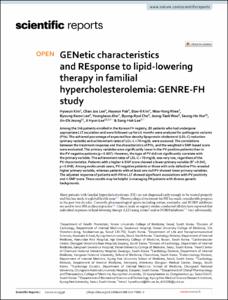KUMEL Repository
1. Journal Papers (연구논문)
1. School of Medicine (의과대학)
Dept. of Internal Medicine (내과학)
GENetic characteristics and REsponse to lipid-lowering therapy in familial hypercholesterolemia: GENRE-FH study
- Keimyung Author(s)
- Hur, Seung Ho
- Department
- Dept. of Internal Medicine (내과학)
- Journal Title
- Scientific Reports
- Issued Date
- 2020
- Volume
- 10
- Abstract
- Among the 146 patients enrolled in the Korean FH registry, 83 patients who had undergone appropriate LLT escalation and were followed-up for ≥ 6 months were analyzed for pathogenic variants (PVs). The achieved percentage of expected low-density lipoprotein-cholesterol (LDL-C) reduction (primary variable) and achievement rates of LDL-C < 70 mg/dL were assessed. The correlations between the treatment response and the characteristics of PVs, and the weighted 4 SNP-based score were evaluated. The primary variables were significantly lower in the PV-positive patients than in the PV-negative patients (p = 0.007). However, the type of PV did not significantly correlate with the primary variable. The achievement rates of LDL-C < 70 mg/dL was very low, regardless of the PV characteristics. Patients with a higher 4-SNP score showed a lower primary variable (R2 = 0.045, p = 0.048). Among evolocumab users, PV-negative patients or those with only defective PVs revealed higher primary variable, whereas patients with at least one null PV showed lower primary variables. The adjusted response of patients with FH to LLT showed significant associations with PV positivity and 4-SNP score. These results may be helpful in managing FH patients with diverse genetic backgrounds.
- Keimyung Author(s)(Kor)
- 허승호
- Publisher
- School of Medicine (의과대학)
- Citation
- Hyoeun Kim et al. (2020). GENetic characteristics and REsponse to lipid-lowering therapy in familial hypercholesterolemia: GENRE-FH study. Scientific Reports, 10, 19336. doi: 10.1038/s41598-020-75901-0
- Type
- Article
- ISSN
- 2045-2322
- Source
- https://www.nature.com/articles/s41598-020-75901-0
- Appears in Collections:
- 1. School of Medicine (의과대학) > Dept. of Internal Medicine (내과학)
- 파일 목록
-
-
Download
 oak-2020-0794.pdf
기타 데이터 / 910.95 kB / Adobe PDF
oak-2020-0794.pdf
기타 데이터 / 910.95 kB / Adobe PDF
-
Items in Repository are protected by copyright, with all rights reserved, unless otherwise indicated.